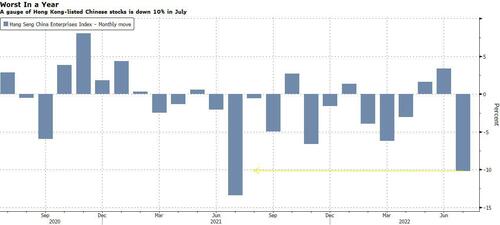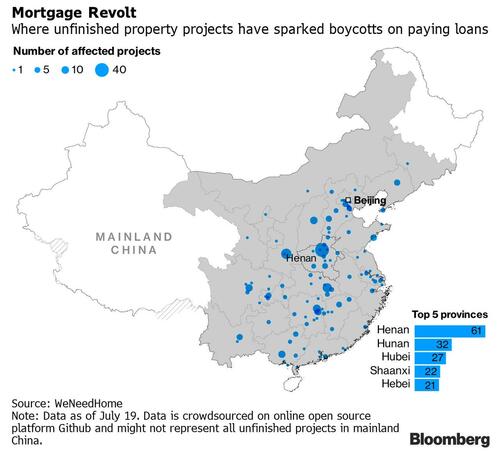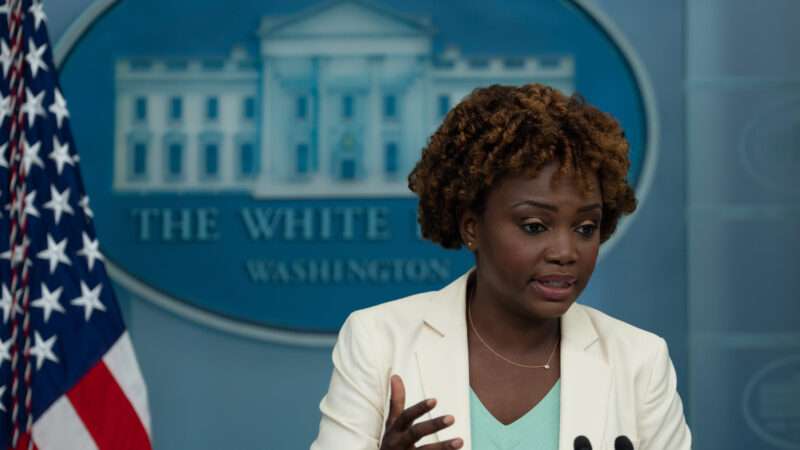The House of Representatives today approved H.R 1808, which would ban the production and sale of “assault weapons,” including semi-automatic rifles with features such as pistol grips, folding or adjustable stocks, barrel shrouds, and threaded barrels. It also would ban a long list of specific models by name.
The bill, which passed the House by a vote of 217 to 213, has no chance in the evenly divided Senate, where support from at least 10 Republicans would be required to overcome a filibuster. House approval of H.R. 1808 is therefore a symbolic act aimed at energizing Democrats and encouraging them to vote in this fall’s elections. But several House Democrats, whose objections nearly derailed today’s vote, worried that it would hurt their party’s candidates more than it would help them. In the end, five Democrats joined all but two Republicans in voting against the bill.
The fear that today’s gesture could alienate more voters than it attracts seems rational given what happened after Congress approved similar legislation in 1994: Democrats lost control of the House and Senate. Polling data provide further reason to think that the House vote to revive the ban, which expired in 2004, could be politically perilous.
“There was uncertainty that an assault weapons ban has the votes in a chamber where Democrats have only a razor-thin four-member majority,” The Washington Post noted on Wednesday. “Rep. Kurt Schrader (D-Ore.), who recently lost his primary bid to a liberal Democrat, has publicly said he would vote against the ban. Other front-line members representing rural districts also expressed hesitancy in backing it.”
Schrader argued that approving H.R. 1808 would cost Democrats in November. “This is a bill that destroyed the Democrats in ’94,” he told Politico earlier this month. “Do we really have a death wish list as Democrats?”
Vic Fazio, a former chair of the House Democratic Caucus who represented two California districts from 1979 to 1999, agrees with Schrader’s take on what happened in 1994. By folding the “assault weapon” ban into the 1994 crime bill, Fazio told The Daily Beast in 2019, “we put a lot of folks on the line…In really strong gun states, it was seen as poison.”
In addition to Schrader, who was a firm no, at least three other House Democrats seemed to have doubts about H.R. 1808. Reps. Peter DeFazio (D–Ore.) and Mike Thompson (D–Calif.) declined to say whether they would vote for it. According to Politico, even Rep. Jim Cooper (D–Tenn.), who was listed as a cosponsor of the bill, said “he wanted to see the language,” which did not bode well.
“Last time, we didn’t necessarily define ‘semi-automatic [assault weapon]’ very well,” Cooper told Politico. Nor does the new, supposedly improved version.
Like H.R. 1808, the 1994 ban covered a bunch of listed models, along with “copies” of them. Also like H.R. 1808, it included a more general definition of prohibited rifles, which hinged on the presence or absence of five features: a folding or telescoping stock, a pistol grip, a bayonet mount, a grenade launcher, or a “flash suppressor or threaded barrel designed to accommodate a flash suppressor.” Any two of those transformed a legal rifle into a prohibited “assault weapon.”
Under H.R. 1808, one prohibited feature is enough to make a semi-automatic rifle intolerable, and the list is somewhat different. The much-ridiculed reference to bayonet mounts is gone, for example, replaced by barrel shrouds. But the basic approach is the same. So if there was a problem with the 1994 definition of “assault weapons,” there is also a problem with the 2022 definition.
The problem, as Joe Biden explained before he was elected president, was that gun manufacturers could comply with the 1994 law by “making minor modifications to their products” that left them “just as deadly.” Removing the prohibited features did not affect the essential properties of semi-automatic rifles, which still fired the same ammunition at the same rate with the same muzzle velocity.
Biden nevertheless is proud of backing the 1994 ban, which he contradictorily (and implausibly) claims reduced mass-shooting deaths. He thinks fiddling with the language can correct the essential weakness of that law, which by his own account left many equally deadly firearms on the market. But that weakness is inherent in the puzzling distinctions drawn by this sort of law.
If anything, H.R. 1808 underlines the arbitrariness of those distinctions. It includes a 94-page list of firearms that are explicitly exempted from the ban. The Iver Johnson M1 carbine, for example, is allowed, provided it does not have a folding stock, a feature that has no impact on the gun’s lethality. The Ruger Mini-14 Ranch rifle is likewise exempted, as long as it has a fixed stock and does not have a pistol grip. Yet the Ruger Mini-14 Tactical rifle (Model 5888), which is otherwise functionally identical, is prohibited.
For obvious reasons, Democrats did not want to talk about details like those, instead relying on misdirection and misstatements of fact to make the case for the bill. But after decades of legislation based on such dubious distinctions, Americans may be wising up. In a Quinnipiac University poll conducted in early June, just 50 percent of respondents favored “a nationwide ban on the sale of assault weapons,” while 45 percent were opposed and 5 percent offered no opinion. As Fox News noted, that was “the lowest level of support since February 2013,” when Quinnipiac first posed the question. The results are especially notable because the survey was completed just two weeks after the mass shooting in Uvalde, Texas.
Gallup first asked Americans about “assault weapon” bans in 1989. The question was worded this way: “Would you favor or oppose federal legislation banning the manufacture, sale and possession of semi-automatic assault guns, such as the AK-47?” Seventy-two percent of respondents said they would support such a law. But since the original AK-47 was a military rifle that could fire continuously with one trigger pull, rather than a semi-automatic rifle that fires once per trigger pull, that result may have been biased upward by a misleading question.
In 1996, two years after Congress approved the now-expired ban, Gallup asked a different question: “Would you vote for or against a law which would make it illegal to manufacture, sell or possess semi-automatic guns known as assault rifles?” In response to that question, which still left the definition of “assault rifles” unclear, 57 percent of the participants said they supported such a law. Gallup used the same wording in 2000, when support for a ban was slightly higher: 59 percent.
In 2004, the year that the 1994 ban expired, Gallup asked, “Are you for or against a law which would make it illegal to manufacture, sell or possess semi-automatic guns known as assault rifles?” Just 50 percent of respondents favored a ban, the same level of support that Quinnipiac found last month. In polls conducted from 2011 through 2018, that figure ranged from 36 percent to 48 percent.
Two Gallup polls conducted in 2013 asked yet another question: “Would you vote for or against a law that would…reinstate and strengthen the ban on assault weapons that was in place from 1994 to 2004?” A majority—56 percent in one poll and 60 percent in the other—was in favor of that proposition.
Gallup’s most recent poll on the issue, conducted last month, phrased the question this way: “Do you think there should or should not be a ban on the manufacture, possession and sale of semi-automatic guns known as assault rifles?” Fifty-five percent of respondents said there should be such a ban.
It is hard to know what to make of these results, especially given the variations in wording. The references to banning possession of the targeted rifles may have been misleading, since the 1994 ban did not apply to firearms that Americans already owned. H.R. 1808 includes a similar grandfather clause. Crucially, none of these questions clarified what “assault weapons” are, and it is likely that many respondents were unfamiliar with how legislators have defined the term.
As the Associated Press Stylebook notes, the assault adjective “convey[s] little meaning about the actual functions of the weapon.” The A.P. recently reminded reporters that they should avoid the term assault weapon, which is “highly politicized.”
Still, it’s clear that bans on “assault weapons,” whatever poll participants think those might be, are far less popular than other gun control policies that Democratic politicians favor. In last month’s Gallup poll, for example, 92 percent of respondents favored “requiring background checks for all gun sales,” and more than 80 percent favored “red flag” laws, which authorize court orders prohibiting possession of guns by people who are deemed a threat to themselves or others.
Even such seemingly massive support does not necessarily tell us how people will vote when they have a chance to actually enact such policies through ballot initiatives. As The New York Times noted last month, the gap between “expected support” for “universal background checks” (based on polling) and “actual support” (based on election results) was 28 points in California, 22 points in Washington, 36 points in Nevada, and 35 points in Maine. Those gaps may reflect the difference between answering a survey question about a gun policy in the abstract and casting a vote for a specific measure after a campaign in which the pros and cons have been debated.
If Democrats can’t count on people who express support for a particular gun policy to vote accordingly on that very issue, it seems even more doubtful that people who say they favor more gun control will reward politicians for agreeing with them in elections that involve many other issues. The relevant question is not what people say in surveys but how strongly they feel about it and how likely it is to affect their voting.
On that score, research suggests that Democrats could be at a disadvantage. In a CNN/SSRS poll conducted earlier this year, for example, 41 percent of registered voters said “gun policy” was “extremely important” in deciding which congressional candidate to support. Republican-leaning voters were more likely to say that than Democratic-leaning voters (45 percent vs. 40 percent).
In 2013, after Colorado voters recalled two Democratic state legislators in campaigns driven by their support for gun control, the Pew Research Center noted that “intensity of feeling” can play a crucial role in election outcomes. The center’s polling found that “41% of people who prioritize gun rights said they wouldn’t vote for a candidate with whom they disagreed on gun policy, even if they agreed with the candidate on most other issues.” By comparison, “only 31% of gun-control supporters said gun policy was a make-or-break voting issue for them.”
Another 2013 Pew report elaborated on that point. “There is a substantial gap between those who prioritize gun rights and gun control when it comes to political involvement,” it said. That gap was reflected in “donations to activist organizations” as well as voting intentions. “Nearly half of conservative Republicans (47%) say they would not vote for a candidate who agreed with them on most issues, but disagreed with them on gun policy,” Pew reported, while “37% of liberal Democrats” said the same thing.
The Democrats who pushed today’s vote figured it would make them look good to voters while making Republicans look bad. But if people who oppose an “assault weapon” ban are more inclined to vote on that basis than people who support it, re-upping this policy a few months before congressional elections could turn out to be a big mistake.
The post The Dubious and Doomed 'Assault Weapon' Ban That the House Approved Today May Cost Democrats This Fall appeared first on Reason.com.
from Latest https://ift.tt/bd37oJq
via IFTTT








